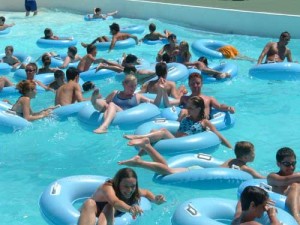Swimming Pool Precautions
Written by Post Public Information Representative, Jul 23, 2009, 0 Comments
Laredo, TX – -The City of Laredo Health Department would like inform the public that we have seen an increase of bacteria in swimming pools, particularly in apartment complex pools and hotel/motel pools. In large part this has been due to the unusually high numbers of persons swimming as a way to cool-off in these extremely high temperatures. While we want the public to enjoy themselves in recreational waters we caution the owners and the public to take extra precautions to avoid a potential risk of exposure to bacteria that can cause one to get ill.
For General Users of Swimming Pools:
- Make sure to rinse before entering into a swimming pool and after.
- Wash hands before eating or drinking anything after swimming.
- Children in diapers should not be allowed in public pools.
- Everyone must wear appropriate swim wear no street clothes.
- No person with diarrhea should be allowed to swim.
- Always follow all safety rules
For owners of Swimming pools (includes Water parks):
Chlorine levels should be maintained and checked regularly,
- Samples of water can be submitted to the City of Laredo Health Department for bacteriological quality control purposes (there is a cost for this).
- Make sure to scoop up any floating debris.
- Make sure swimmers rinse before entering and only allow appropriate swim wear—no street clothes.
- Staff should test and evaluate water for fecal matter, ph and chlorine levels. Make sure to check and change filters often and/or as needed.
- If fecal matter is found in a swimming pool the standard protocol is to shut the pool and hyper chlorinate, flushing the lines.
- For those with repeat testing because of bacteria presence we recommend shocking of the pool water, taking extra chlorine testing samples, changing filters more often, making sure all greenery, shrubs, etc. around pools are kept cut, trim and clean, also keep all pets away from any potential drainage or runoff into the pool area
- Manual chlorine and PH testing should be done every 2-3 hours, keeping a log to record chlorine and PH levels.
- All equipment and water systems should be monitored for proper function on a daily basis and cleaned routinely. This includes pumps, chlorinator, holding tank etc.
- It is highly recommended that staff monitor and enforce water safety, use of appropriate swim wear, and to safeguard the facilities.




